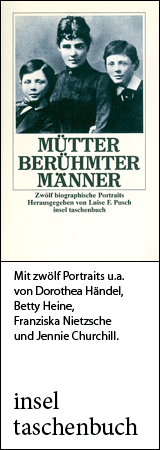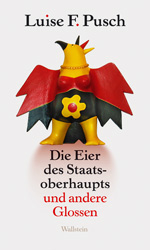Biographies Fanny Hensel, geb. Mendelssohn

(Fanny Cäcilia Hensel geb. Mendelssohn Bartholdy)
born November 14, 1805 in Hamburg
died May 14, 1847 in Berlin
German composer
175th anniversary of death on May 14, 2022
Biography
“Music will perhaps become a profession for Felix, while for you it can and must only ever be an ornament, never the root of your being and doing…” wrote the banker Abraham Mendelssohn to his 14-year-old daughter Fanny. The eldest of four children, and born into an enlightened and cultured Jewish family, she therefore knew early on that she would never be allowed to become a professional musician. Nevertheless, she initially received the same excellent music lessons as her younger brother Felix (1809-47), whom she loved dearly. They remained close throughout their lives and influenced each other artistically. The few trips Fanny was allowed to make (to Switzerland in 1822, to Italy in 1839-40) were points of light in her life, and her wonderfully descriptive, witty letters show her enthusiasm.
Travelling, stimulation and recognition from outside - all these options were open to the brother, while her talent threatened to wither away: “That I stick with it in the face of such a complete lack of stimulation from outside, I interpret to myself again as a sign of talent.” After her marriage to the painter Wilhelm Hensel (brother of Luise Hensel), she also performed her own choral and orchestral works at Sunday musical concerts in her Berlin apartment. It was not until a year before her death that Felix gave his sister the “blessing of the trade” - his permission to print some of her works.
It was not until 1976 that the world's largest encyclopedia of music (MGG - Musik in Geschichte und Gegenwart) included Fanny Hensel in its appendix: “her compositional output, which comprises more than 400 individual pieces, has not yet been studied in depth.” Oratorios, cantatas, festival pieces, songs and piano pieces are among them. In 1984, her “Oratorio on Words from the Bible” was performed again, and many more works followed. Harmonically, her works often reach beyond those of her brother, her songs “belong to the very best that we possess in terms of songs” (Felix Mendelssohn), and her trio should actually have long been a standard work of the chamber music repertoire. (Text from 1996)
Translated with www.DeepL.com/Translator (free version), edited by Almut Nitzsche and Joey Horsley, May 2022
Author: Eva Rieger
Quotes
Fanny's wonderful music, which so grips you and which you can never grasp, has many possibilities of sound development. If it were always the same 'trick', one could probably develop an analytical refinement to grab it after all. But it eludes this through the variability of its creative potency.
(Diether de la Motte)
What do my compositions matter? After all, no one cares about them, and no one dances to my tune.
(Fanny Hensel)
She was small in stature and had - an inheritance from Moses Mendelssohn - a crooked shoulder, but this was hardly noticeable. The most beautiful thing about her were her large, dark, very expressive eyes, which did not reveal her nearsightedness. The nose and mouth were quite strong, and she had beautiful white teeth. Her hand showed the training she had received from playing the piano. She was quick and decisive in her movements, her face was very lively and reflected all moods faithfully; pretense was impossible for her. Therefore, everyone soon realized how he stood with her; for as certain as the joy over a dear, gladly seen person was immediately apparent, just as threatening were certain wrinkles around the forehead and the corners of the mouth, if someone unpleasant annoyed her.
Few can rejoice as intensely as she could over everything beautiful: lovely weather, beautiful people, beautiful talents, beautiful nature. Fresh air she inhaled deeply and fully, declaring it one of her greatest pleasures. Equally intense, however, was her annoyance at anything ugly, her anger at anything bad. She was very intolerant of boring, bland, vain and hollow people, and had certain bêtes noires against whom she could not overcome her antipathy. Her face would then soon take on an expression of such deep unhappiness that she would often put those around her into the greatest merriment, since the cause was so out of proportion to the mood it evoked in her. When this had passed, she herself laughed about it and was just as incapable of restraining herself the next time.
She was quite indifferent to material pleasures: good food and drink, comforts, dress. Luxuries of all kinds were not necessary for her life; but contact with educated, intelligent people, in a smaller circle, and the pleasures of art were. Her sense of freedom was deeply rooted in her nature: she was very reserved against nobility and all pretensions of birth and purse. Visits and all so-called “social duties” were very annoying to her, and she evaded them as much as possible. - But she was the most loyal and steadfast friend to all those whom she considered worthy of closer acquaintance, and she would make any sacrifice for them.
(Sebastian Hensel about his mother, Fanny Hensel, née Mendelssohn)
If you hold the rights to one or more of the images on this page and object to its/their appearance here, please contact Fembio.



